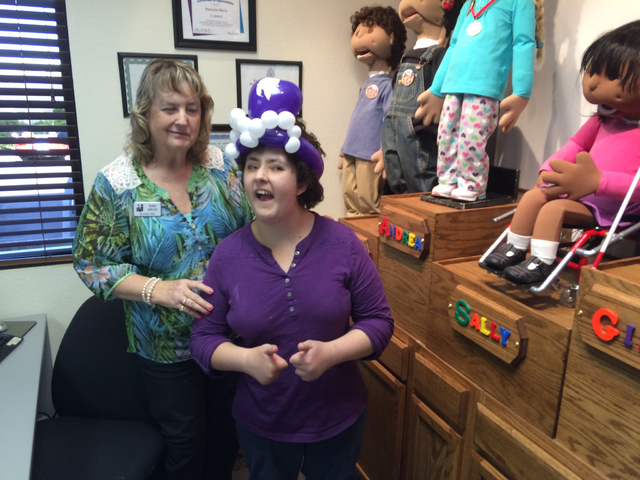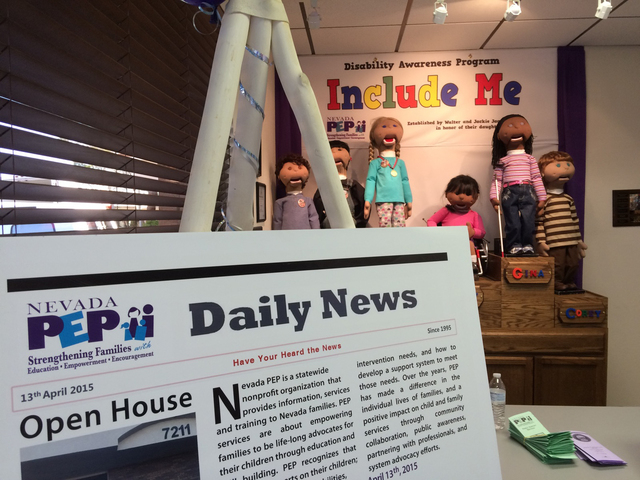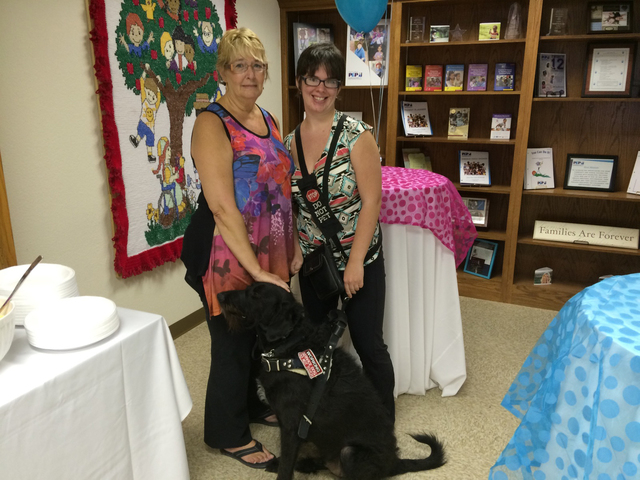Nonprofit group guides parents of children with disabilities toward services, resources



It’s the kind of place that, as a parent, you hope you never need to visit. But if you do, you’re awfully grateful it’s there.
Nevada PEP — Parents Encouraging Parents — has been around for about 20 years, providing parents of children with disabilities with information and resources. It recently celebrated the move to its new location at 7211 W. Charleston Blvd.
The nonprofit works under the auspices of the U.S. Department of Education, guiding parents of children with disabilities toward available services and showing them how to access them. “Children” can mean young adults, as well, up to age 26.
“We get parents all the time telling us, ‘If it wasn’t for you, I don’t know what I would do,’ ” said Stephanie Vrsnik, the group’s community development director. “We know we’ve made a difference in their lives, so they can help their child be successful.”
Every state has at least one such service information organization that empowers parents to be advocates for their children and build a support system. Nevada PEP is the only one in Nevada. It also has a satellite office in Reno.
The roughly 8,000 square feet of office space is smaller than its former digs at 2101 S. Jones Blvd., but the rebounding economy means leasing rates are going up. Hence the reason for the move. But Nevada PEP staffers say they can provide all the services they did before: providing information and referrals; public awareness; special community outreach; individual assistance; and conducting more than 200 training workshops a year for parents, teachers, social workers and day care providers.
Founder Karen Taycher said it’s had steady growth since it started.
“And more and more, state and federal grants are recognizing the benefits of supporting parents so they are not in a crisis situation,” she said, “but have the support and information they need ongoing.”
The biggest benefit to parents is how to access services and how to ask the right questions, she said.
“Sometimes, when you have a need, if you don’t know what to ask, you get a lot of doors shut on you,” Taycher said. “Maybe you ask for after-school care. Well, there is no after-school care for kids with disabilities. But there is respite care. If you don’t know the terminology ‘respite,’ then you won’t find what you need.”
Sometimes it’s the parent who needs the help. Caring for a child who has special needs can be overwhelming, and some days can be more stressful then others. Anger and frustration can kick in.
“When you connect with another parent, and they know what you’re feeling … just having that connection that you’re not alone and there are resources out there, help,” Taycher said.
Perhaps just as important, all those on the staff are there because they have been there themselves. Thus, there were various examples around the office of how Nevada PEP has helped families.
Rita Varney, whose daughter Sara receives services through Nevada PEP, is on the board. They both volunteer for the organization, such as at the fall 5K event, Run, Walk and Roll Against Bullying. Sara was born a healthy baby, but at 10 months, she had a stroke. Multiple issues, both neurological and physical, stemmed from that episode.
“So, we went from having a normal baby to having an infant again,” Rita said. “… It was a learning process from the very beginning, learning every single stage you could possibly go through.”
They moved to Las Vegas almost eight years ago. Rita was expecting a smooth transition for finding services but found the opposite.
“I was a special ed advocate in New Jersey, so I was familiar with the process,” she said. “But when we moved here, I couldn’t find (services). I needed help … you had to go out and seek it. It wasn’t in the schools like it was in New Jersey.”
Robin Kincaid recalled how her second pregnancy included plenty of tests to ensure the fetus was developing normally. Her first child was born with a form of spina bifida. Luckily, his challenge was addressed with an operation when he was 3 months old. They were relieved to learn that their second child, who was soon to be born, would have no such issues.
Except she did. Kayla was born with a cleft palate.
“That was the most noticeable concern, but she also didn’t seem to have much ‘tone’; she was kind of floppy (in her movements),” Kincaid said. “… It seemed like it was happening again. I was concerned we’d have a lot of future medical issues. There was a tendency to think that since our first child had surgery and had done well, then perhaps our second child could just have surgery and do well, too. It took a while to recognize that this was a lifelong (situation).”
Several surgeries later, including a dozen to address hip issues, and Kayla faces life today as a 23-year-old with special challenges. Nevada PEP helped the family find the resources they needed.
Nevada PEP served 16,000 individuals last year. Each week, Vrsnik said, it sees 30 to 35 new families seeking guidance.
About three years ago, Nevada PEP received six life-size puppets to forward its anti-bullying stance. The child-sized puppets each have some type of handicap, such as being hearing- or sight-challenged. One is in a wheelchair, and another is autistic. The puppet program helps educate young children that students with disabilities are, at their core, just like them.
“We take them to the preschools,” Vrsnik said of the puppets. “We want to catch them young.”
For more information on Nevada PEP, visit nvpep.org or call 702-388-8899.
To reach Summerlin Area View reporter Jan Hogan, email jhogan@viewnews.com or call 702-387-2949.
Nevada PEP
For more information on Nevada PEP, visit nvpep.org or call 702-388-8899.












